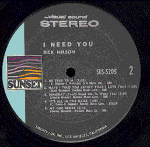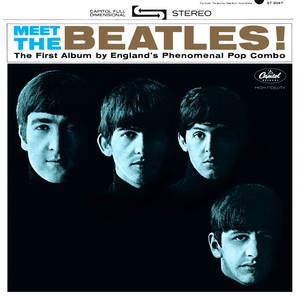
Capitol Records, LLC, and simply known as Capitol, is an American record label owned by Universal Music Group through its Capitol Music Group imprint. It was founded as the first West Coast-based record label of note in the United States in 1942 by Johnny Mercer, Buddy DeSylva, and Glenn E. Wallichs. Capitol was acquired by British music conglomerate EMI as its North American subsidiary in 1955. EMI was acquired by Universal Music Group in 2012, and was merged with the company a year later, making Capitol and the Capitol Music Group both distributed by UMG. The label's circular headquarters building is a recognized landmark of Hollywood, California.

Vee-Jay Records is an American record label founded in the 1950s, located in Chicago and specializing in blues, jazz, rhythm and blues and rock and roll.

Imperial Records is an American record company and label started in 1947 by Lew Chudd. The label was reactivated in 2006 by EMI, which owned the label and back catalogue at the time. Imperial is owned by Universal Music Group.

"She Loves You" is a song by the English rock band the Beatles, written by John Lennon and Paul McCartney and released as a single in the United Kingdom on 23 August 1963. The single set and surpassed several sales records in the United Kingdom charts, and set a record in the United States as one of the five Beatles songs that held the top five positions in the charts simultaneously, on 4 April 1964. It remains the band's best-selling single in the UK and was the top-selling single of the 1960s there by any artist.
Warner Records Inc. is an American record label. A subsidiary of the Warner Music Group, it is headquartered in Los Angeles, California. It was founded on March 19, 1958, as the recorded music division of the American film studio Warner Bros.

Sunset Records was a record label started in 1965 as the budget album subsidiary of Liberty Records to reissue and issue material originally recorded for Liberty, Imperial, Minit and other Liberty subsidiaries as well as leased material from other entities.

United Artists Records was an American record label founded by Max E. Youngstein of United Artists in 1957 to issue movie soundtracks. The label expanded into other genres, such as easy listening, jazz, pop, and R&B.

Meet the Beatles! is a studio album by the English rock band the Beatles, released as their second album in the United States. It was the group's first American album to be issued by Capitol Records, on 20 January 1964 in both mono and stereo formats. It topped the popular album chart on 15 February 1964 and remained at number one for eleven weeks before being replaced by The Beatles' Second Album. The cover featured Robert Freeman's iconic portrait of the Beatles used in the United Kingdom for With the Beatles, with a blue tint added to the original stark black-and-white photograph.

Robert Thomas Velline, known professionally as Bobby Vee, was an American singer who was a teen idol in the early 1960s and also appeared in films. According to Billboard magazine, he had thirty-eight Hot 100 chart hits, ten of which reached the Top 20. He had six gold singles in his career.

The Early Beatles is the Beatles' sixth album released on Capitol Records, and their eighth album overall for the American market. All of the tracks on this album had previously been available on the Vee-Jay Records release Introducing... The Beatles, issued in January, 1964. The front cover photo for this album features the same back cover photo for the British LP Beatles for Sale.

Introducing... The Beatles is the first studio album released by the English rock band the Beatles in the United States. Originally scheduled for a July 1963 release, the LP came out on 10 January 1964, on Vee-Jay Records, ten days before Capitol's Meet the Beatles! The latter album, however, entered the U.S. album chart one week before the former. Consequently, when Meet The Beatles! peaked at No. 1 for eleven consecutive weeks, Introducing...The Beatles stalled at No. 2 where it remained for nine consecutive weeks. It was the subject of much legal wrangling, but ultimately, Vee-Jay was permitted to sell the album until late 1964, by which time it had sold more than 1.3 million copies. On 24 July 2014 the album was certified gold and platinum by the RIAA.
Dolton Records was a record label based in Seattle that was originally known as Dolphin Records. It was initially owned by Bob Reisdorff and Bonnie Guitar. Success for the label came early with "Come Softly to Me" by the Fleetwoods, the first single to be released on that label.
Simon Waronker was an American violinist and record producer from Los Angeles, California, best known for co-founding Liberty Records.
Lenny Waronker is an American record producer and music industry executive. As the president of Warner Bros. Records, and later, as the co-founder and co-chair of DreamWorks Records, Waronker was noted for his commitment to artists and his belief that "music, not money, was still number one."

Sal Solo is an English singer.
Thomas Lesslie Garrett known as Snuff Garrett or Tommy Garrett, was an American record producer whose most famous work was during the 1960s and 1970s.

Classix Nouveaux is an English new wave band. During a six-year career between 1979 and 1985 they released three albums and eleven singles, the most commercially successful of which was the single "Is It A Dream" that reached No.11 in the UK Singles Chart.

"Witch Doctor" is a 1958 American novelty song written and performed by Ross Bagdasarian, under his stage name David Seville. It became a number one hit and rescued Liberty Records from near-bankruptcy.
This is the complete discography of the fictional music group Alvin and the Chipmunks.
The Beatles experienced huge popularity on the British record charts in early 1963, but record companies in the United States did not immediately follow up with releases of their own, and the Beatles' commercial success in the US continued to be hampered by other obstacles, including issues with royalties and public derision toward the "Beatle haircut".












